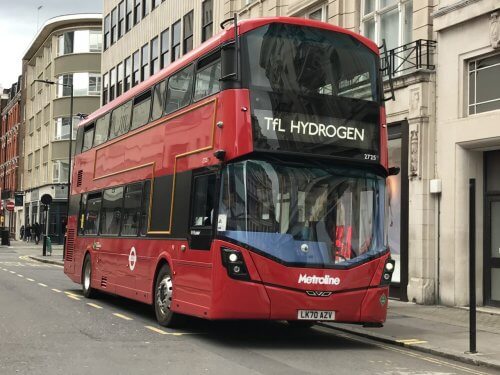TfL’s first hydrogen-powered double-decker buses have entered service with Comfort Delgro-owned Metroline
Transport for London (TfL) has placed the first of 20 zero-emission hydrogen fuel cell-electric Wrightbus StreetDeck into service with Metroline. The new buses are part of TfL’s drive to make London’s transport zero-emission. The environment-friendly vehicles will operate on routes 7 and N7, with people travelling to Wembley Stadium or from west London to the West End, able to hop on the new green buses for a smoother and quieter journey. The new buses will also enhance the customer experience, with on-board USB charging points installed. TfL has invested £12m in the new buses and the fuelling infrastructure. The buses were manufactured by Wrightbus in Northern Ireland, and more than £5 million of funding is being provided by European bodies the Fuel Cells and Hydrogen Joint Undertaking (FCH JU) and the Innovation and Networks Executive Agency (INEA), an executive agency of the European Commission. A further £1 million has come from the Office of Low Emission Vehicles (OLEV). To encourage the take-up of this technology in other cities in the UK and Europe, TfL is leading procurement within the ‘Joint Initiative for hydrogen Vehicles across Europe’ (JIVE) project. JIVE aims to bring down the cost of the vehicles by buying in bulk with other authorities — helping put the price per bus on a par with the other cleanest fuels.
Aberdeen was the first city to introduce these vehicles as part of the project, with the London launch being delayed due to Covid-19 until now, and Birmingham is next to launch with a further 20 buses later this year. Sadiq Khan, Mayor of London, said: “We all have a role to play in cleaning up London’s toxic air and I’ve always said that TfL should lead from the front. We are investing a record £85m in cleaning up our bus fleet, and I am proud that London now has the largest zero-emission bus fleet in Europe.” As part of the Mayor’s Transport Strategy, TfL is committed to using only the cleanest buses in its fleet. Ten Low Emission Bus Zones have been introduced, reducing harmful NOx emissions by 90% on some of the capital’s busiest roads. Greening transport in the capital will require using a range of clean power sources. Hydrogen buses can store more energy on board than equivalent battery-electric buses, meaning they can be deployed on longer routes, and they only need to be refuelled once a day. Claire Mann, TfL’s Director of Bus Operations, said: “London has the cleanest bus fleet in Europe, but we know we need to go further and faster to tackle the public health emergency caused by dirty air. Innovating and using hydrogen means we have flexibility in matching the right fuel with the operational requirements of the network. “We are also pleased to be leading an initiative that brings down the cost of buying the greenest buses across the continent and within our own country, as we know pollution doesn’t respect national or local boundaries.”
Dr Penny Woods, Chief Executive of the British Lung Foundation, said: “London’s air is toxic, and it needs to change. We know air pollution is a threat to all our health, and children, the elderly and those with existing lung and heart problems are most at risk, so it’s good to see the Mayor of London tackling the issue head on. This move to cleaner public transport, alongside the introduction of the ULEZ, shows London’s leading the way in the fight to clean up the air we breathe and we look forward to seeing even more ambitious action from TfL.” Darren Shirley, Chief Executive of Campaign for Better Transport, said: “Millions of people across the country live in areas which currently exceed legal limits for air pollution. Cities need to be doing more to improve their air quality, including investing in clean technologies as a matter of urgency. We welcome this move to clean up London’s bus fleet and its polluted air.


